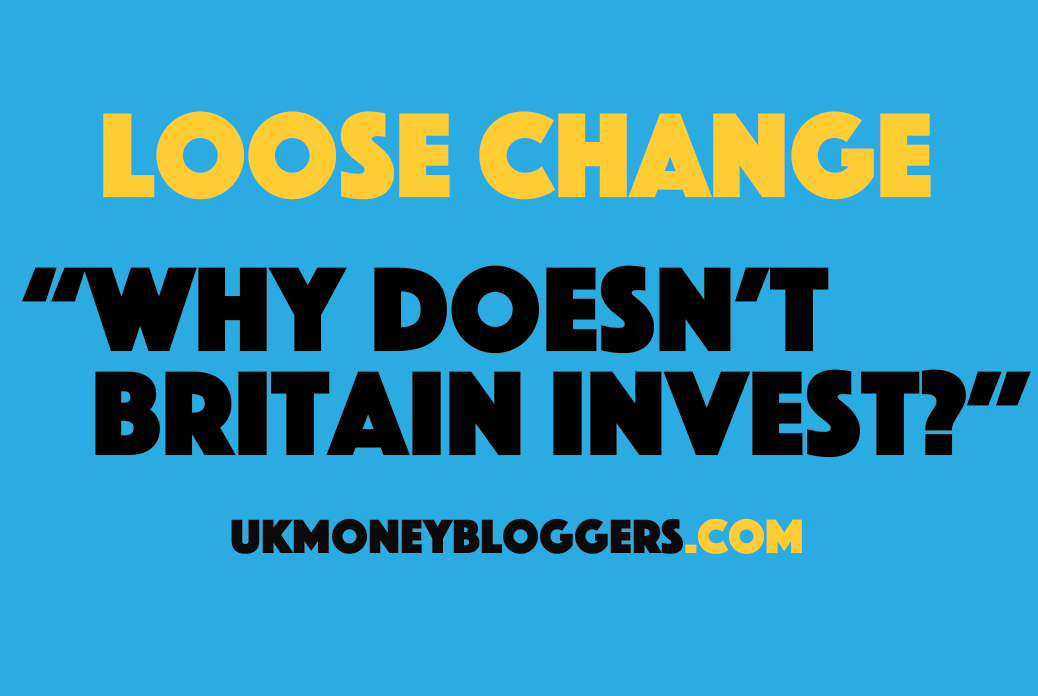Loose Change is a series of blogposts by members of the UK Money Blogger community where they let loose on a financial issue important to them.
This week Simon from the Financial Expert blog shares his frustration that we’re not a nation of investors.
——-
The highest interest rate you can earn on a quick-access savings account right now is a very disappointing 1.46%.
As a reminder, the current rate of inflation is roughly 1.7%, which means that interest income is not sufficient to keep pace with the increase in the cost of living.
You might reach the conclusion that this state of affairs for bank savers has hit a new low – but you’d be wrong.
Bank accounts have actually performed poorly against inflation for decades. Interest rates were as high as 4% before the financial crisis in 2006. What people often forget is that inflation rates were also very high.
Whether the economy is booming or bursting, risk-free bank interest merely allows savers to ‘tread water’ at best.
For true growth, savers must look elsewhere.
The other options
Attractive alternatives include shares, property, corporate bonds and other opportunities.
But these options are far from popular.
Statistics show that Brits hold 2.2 million Stocks and Shares ISAs. Outside of a pension, ISAs are the most efficient way to hold shares and therefore these will account for the majority of individual investing accounts.
Now, 2.2 million is a large figure in isolation. But in a population of 66 million people, this is an uptake of only 1 in every 30 Brits.
This brings me to the big question: ‘Why doesn’t Britain invest?‘
1. The money taboo
Brits don’t like talking about money. Money charities cite this cultural phenomenon as being a key factor in understanding why people in severe financial distress still fail to ask for help.
Even when our head is firmly above the water, we worry that discussions about investments could be viewed as ‘bragging’ or could lead to the deadly awkward question of ‘How much have you got?‘.
Nevertheless, the absence of stocks and shares from dinner table chatter means that investing has an image problem. (Almost) everyone can benefit from investing, but the word isn’t reaching many people because nobody is talking about money in the first place.
2. Scars from the last crash
The 2008 financial crisis was the first stock market crash (and recession) to be covered in the age of 24-hour news.
Headlines of losses, writedowns, bailouts and bankruptcies punctuated the evening TV slots of that year.
When experiences like these are in our pasts, it is easy to vow to never take the same risks as investment bankers. For some, this means staying away from the stock market completely.
Trust in financial institutions was undoubtedly lost. That’s only going to further depress the number of people who decide to use the services of an investment manager or financial adviser.
Stockbrokers and investment managers might not have been at fault for the credit crunch, but they have nevertheless paid a heavy price for the failure of their banking colleagues.
3. High requirements
Before you can buy shares you need to ensure you have met three conditions:
- You can afford to lock the invested money away for longer than five years;
- You have a strong enough risk appetite to tolerate the ups and downs of a volatile stock market; and
- You have a solid understanding of the risks and rewards of being an investor.
If we’re honest – while these are ‘basic principles’ of investing, they’re also high hurdles.
One in four households has zero emergency savings. This means that 25% of the population simply cannot afford to squirrel away even a £1 into an untouchable investment.
Many people I speak to have little interest in the stock market because they demand certainty from their investments. They work hard to accrue the savings they have and they do not want to risk loss, even if higher returns are on the table.
Finally, investing forms no part of the national curriculum. It isn’t taught in school, therefore unless someone’s job happens to give them financial expertise, investing knowledge not land at people’s feet.
4. A financial education gap
This is precisely why I rebuilt my website this summer to take the form of free investing courses rather than providing general saving tips.
The financial media tends to cover savings and spending at the expense of useful articles about investing. This neglects the reality that people wouldn’t even need to scrimp in later in life if they properly invested their salary in the first place!
In part, this is a chicken and egg problem. A newspaper caters to their reader’s interests. They will understand that only a small proportion of their readership has a Stocks and Shares ISA (unless they’re the Financial Times!)
But a second element – reputational risk – comes into play. With the risk that the stock market may fall tomorrow – would editors feel confident in printing pro-investing articles?
Of course, no respectable financial journalist would offer guarantees to readers. But that won’t stop cautious editors from worrying that some readers may mistake a column as financial advice, and bring lawsuits accordingly if things go wrong.
With these factors on the table, it does not appear that the UK’s take-up of investing accounts is set for a turnaround. All you can do as an individual is to ensure that you’re spreading the word about money and managing your own money responsibly!
Articles in the Loose Change series are written by members of our community. The views do not necessarily represent those of UK Money Bloggers or other members.

